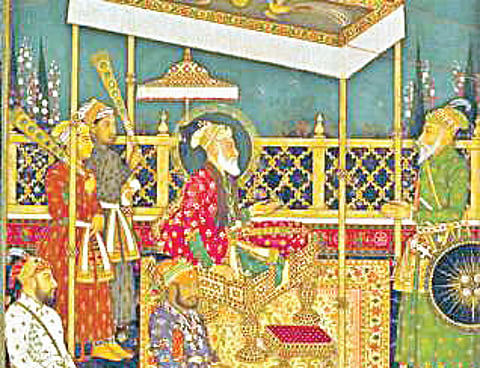

There was nothing that would stop Aurangzeb in his quest to become the ruler of Hindustan. He imprisoned his father and murdered his brothers. He did not trust anyone and considered his own brothers his deadly enemies. He did not even trust his own sons who in turn rebelled against him later. Besides liquidating his brothers, he imprisoned and drove into exile four of his sons except his favourite third son, Prince Azam. Towards Azam, he was loving and indulgent.
Said Aurangzeb, “The art of reigning is so delicate that the king’s jealousy should be awakened by his very shadow.”
Shah Jahan’s favourite son was Dara Shikoh. But Aurangzeb hated him and was determined to get rid of him first and deal with the rest of his brothers later. His fight against Dara was not merely a power struggle but a holy war. Both brothers absolutely despised each other.
While Dara looked down on the fanatical Aurangzeb as a bigot, the latter damned Dara as an infidel. For Dara, it was not a question of good against evil. It was simply that his brothers rebelled against Shah Jahan, who was the legitimate ruler of Hindustan. And so they had to be put down.
The war of succession between the two brothers percolated down to the imperial harem, between their two sisters who were fierce rivals. One sister, the beautiful Jahanara who was loved by all her brothers, favoured Dara although Aurangzeb too loved her dearly. Raushnara, the other sister, stood by Aurangzeb.
Dara was assisted in battle by his son Sulaiman Shikoh. When the decisive battle between Dara and Aurangzeb took place at Samogarh in June, 1658, Sulaiman was unfortunately 400 kilometres away from Agra and could not return in time to save his father or himself. He received the grim news of Dara’s defeat when he was at Kora, 330 kilometres east of Agra.
Abandoned by his generals, Sulaiman, with a small army of 6,000 soldiers sought refuge with the Raja of Garhwal. The Raja was hospitable and even gave him his daughter’s hand in marriage.
For about a year, Sulaiman roughed it out in the hilly terrains of Garhwal. However in 1561 Aurangzeb, who had ascended the throne, reached into the mountains and forced the Raja to surrender the prince. Sulaiman was brought in chains to Delhi and presented in court before Aurangzeb.
Many courtiers shed tears at the sight of this tall and very handsome young man in shackles. The royal ladies of the court who were permitted to be present were greatly moved too, although they were concealed behind lattice work as was customary.
Aurangzeb as expected was unmoved and gloated at the humiliation of the handsome young prince. But he feigned kindness and promised Sulaiman that no harm would come to him. Sulaiman’s only request was that he be put to death right away rather than administered pousta, a narcotic concoction made from crushed poppy heads soaked overnight in water, which given over a period of time slowly turned men into zombies and drained them of life. Sulaiman was determined not to die such a degrading death. Aurangzeb gave him his word that pousta would not be administered to him. Alas, this was the word of a cold blooded and treacherous tyrant.
Sulaiman was sent to Gwalior for confinement where on Aurangzeb’s orders, he was forced to drink pousta every morning. Sulaiman lingered on for a year, more or less a vegetable. He passed away in May 1622, when he was only 30 years old. He was Shah Jahan’s favourite grandson. There was no reason for Aurangzeb to inflict such cruelty on this young man who was no longer any threat to him. By the time Sulaiman was captured, Aurangzeb had already been the emperor for two years. He had already liquidated Dara and Shuja while Shah Jahan and Murad were his prisoners. What could Sulaiman have possibly done to Aurangzeb? But this was Aurangzeb’s way. Caution was his second nature and deception his policy.